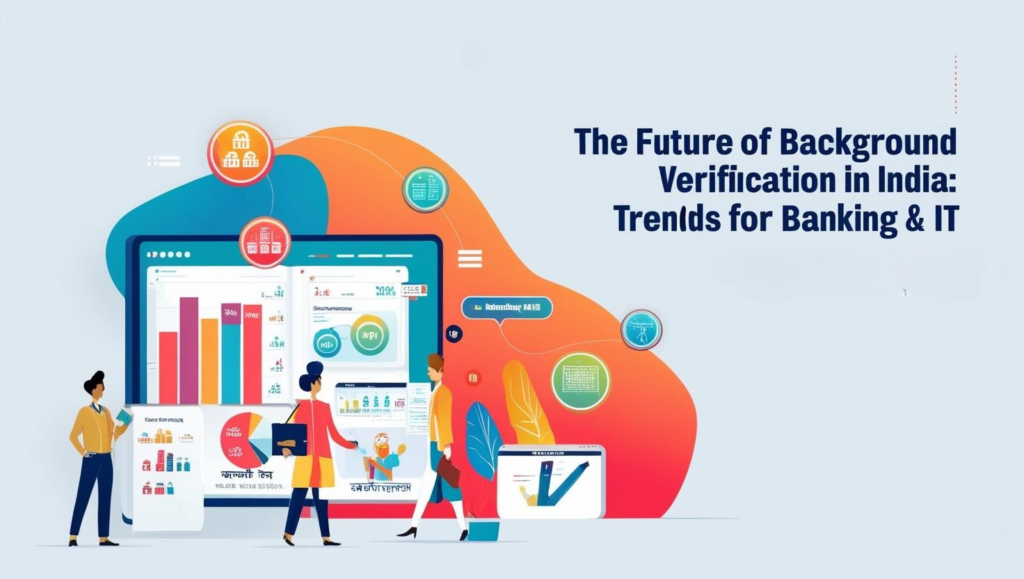The Indian Industry, growing very highly with highly thriving sectors of IT and Banking, is getting to be highly demanding regarding background verification being very robust and dependable. As businesses face issues of security of data as well as compliance along with transparency regarding hiring, the requirement to understand the emerging trends in the area of background verification has emerged.
Why Background Verification is Critical for Banking and IT in India

The stakes are high for background verification in the banking and IT sectors. Here’s why
Banking Sector: This industry involves very confidential customer information and has strict regulatory frameworks; thus, the bank needs to see whether the employee is trustworthy and follows the norms of the industry.
IT Sector: With international clients demanding safe and reliable solutions, it becomes essential for the IT company to verify its credentials and be aligned with the security protocols followed by other countries.
This process of effective verification reduces risks for these industries and ensures compliance for building a brand image that will be trustworthy.
Top Trends in Background Verification for Banking & IT in India
1. Digital Transformation in the Verification Process
Digital-first approach by India has changed the background verification:
E-KYC/ KYC: As a response to compliance, e-KYC has become the key step for verifying employees enabling faster onboarding and validation of data safely.
Automated Document Verification: The AI-based tools can scan and verify PAN cards, Aadhaar cards, and educational certificates in a matter of a minute or two.
Blockchain Integration: Non-modifiable distributed ledgers used for storing the verification of information for generating tamper-proof credentials.
2. AI-Based Analysis for Wiser Decisions
AI and ML have changed the ways of companies scrutinizing potential employees
Prediction Analysis: Prediction algorithms with AI identify the probability of risks based on patterns-attracting attritions or fraudster elements.
Behavioural Analysis-Deep analysis, including the potential employee’s posting in social sites, behavioural indicators, and whether they are cult-fit for helping more judicious decisions.
Real-Time Monitoring: Alert systems track every change in an employee’s record, such as legal issues or updated certifications.
3. Focus on Data Privacy and Compliance
India is changing with a regulatory framework, which governs how the organizations deal with sensitive information; it includes the Personal Data Protection Bill. Verification consent-based, the employer has to get consent from the candidate before conducting any background check and data localization is also there: all the data regarding the background verification is kept in India as that is what is required in the regulatory compliance.
Auditable Processes : open and traceable processes to assure the compliance of the global and local standards, such as GDPR for International clients.
4. Remote Verification Tools
The hybrid work model quickens the pace for a remote-friendly verification process:
Video-Based Verification: involves video calls so that the physical meetings are minimal to verify an identity.
Digital Identity Platforms: DigiLocker or Aadhaar verifications bring in simplicity into the remote background checking process.
Geotagging and Timestamping: Geotagging authenticity is now a part of the processes of remote verification.
5. International Background Checking for Cross Border Recruitment
Indian IT companies are now working with international clients on a regular basis and, subsequently, cross border recruitment is now common:
Global Databases: The platforms ensure instant access to international criminal records, education credentials, and work histories.
Interoperable Systems: Background verification tools are well integrated with the global compliance frameworks that ensure verification without any break across borders.
Localization Features: Themed solutions address region-specific compliance requirements, thus making it easier for Indian organizations to hire internationally.
Challenges in Background Verification in India
Though the future is bright, there are issues that businesses have to address themselves:
A large amount of candidate data will be difficult to process and verify without adequate systems in place.
Non-uniform practice among verification agencies leads to variability on the part of verification agencies.
Small and medium-sized firms can’t afford advanced tools and solutions.
Role of HR Consultancies and Compliance Providers
Change implementation would see an active role played by human resource consultancies and compliance solution providers. For this, here’s what they can do:
Go Advanced with the Technology: Deploy AI, Blockchain, and Auto-tools to speed up and automate services with assurance.
Educate Clients: Engage the companies in importance of proper and detailed background verification and the disasters of its forgetfulness.
Scalable Solutions: Flexible packages designed for large corporate houses and tiny firms alike
Future Outlook: Background Verification in 2025 and Beyond
India, paces into technologies and globalization and would have, in this matter, the trends of background verifications more consolidated platforms that might offer end to end screening of compliance monitoring and well, but the solutions in that time should be industry-norm-specific.
Proactive: Predictive analytics will help businesses pre-empt risks rather than react on them.
Conclusion
Background verification in India, in comparison to many other parts of the world, is set for a great future, particularly for industries like banking and IT, as they have much higher standards for trust and security. If business leaders can predict upcoming trends and stay ahead, they can indeed be compliant, protect their reputation, and make better hiring decisions.
